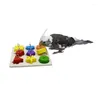As a wild guinea pig consumer, you want to ensure that your furry friend is happy and healthy. One way to do this is by providing natural foraging options. This can improve their health by reducing the risk of dental and digestive problems, as well as give them important mental stimulation which promotes overall wellbeing. Enrichment opportunities are also provided by a variety of natural foraging options, preventing boredom and depression. The best part about this is that it is often cost-effective as many options can be found in your own backyard or purchased inexpensively from stores. By providing natural foraging options, you can ensure your guinea pig leads a happy, healthy life.






Improved Health
Firstly, it’s important to understand the digestive system of guinea pigs. Guinea pigs are herbivores, meaning they only eat plant-based foods. Their digestive systems are designed to process high-fiber diets, which are essential for maintaining a healthy gut. Without enough fiber in their diet, guinea pigs can develop gastrointestinal issues such as bloating, constipation, and diarrhea.
Natural foraging options provide guinea pigs with the opportunity to eat a variety of grasses, herbs, and plants, all of which are rich in fiber. This helps keep their digestive systems healthy and functioning properly. It’s important to note that not all dried hay is created equal, so be sure to choose hay that is fresh, green, and free from dust and mold.
Another benefit of providing natural foraging options is that it can help prevent dental problems. Guinea pigs have continuously growing teeth, which means they need to constantly chew on tough fibrous materials to wear down their teeth and prevent overgrowth. If their teeth become too long, they can develop painful dental problems such as malocclusion or abscesses.
Natural foraging options such as hay, fresh grass, and leafy greens require guinea pigs to use their teeth in a natural way. The act of chewing on these tough materials helps wear down their teeth and keeps them healthy. Additionally, the silica in grass and hay also helps to naturally clean their teeth and prevent plaque buildup.
Mental Stimulation
In the wild, guinea pigs spend a considerable amount of time searching for food and exploring their surroundings. Therefore, in captivity, it is vital to offer them similar opportunities to engage in natural behaviors such as foraging. Providing natural foraging options, such as hay or hiding treats in various locations, not only keeps them occupied but also provides essential mental stimulation.
Mental stimulation is essential for guinea pigs because it helps improve their cognitive function, reduces stress, and promotes overall well-being. A lack of mental stimulation can lead to boredom, which can result in negative behaviors such as overeating, aggression, and depression. These behaviors can lead to health issues, including obesity and dental problems.
Natural foraging options help prevent these issues and promote healthy habits. For instance, providing hay as a primary source of nutrition encourages guinea pigs to chew and grind their teeth, maintaining good dental health. Additionally, hiding treats in different locations encourages them to explore their environment and stimulates their problem-solving abilities.
Moreover, natural foraging options provide an opportunity for social interaction between guinea pigs. When they forage together, they learn to cooperate, communicate, and establish a hierarchy within their group. These skills are essential for their overall social development and can reduce the likelihood of aggressive behavior towards other guinea pigs or humans.
Furthermore, providing natural foraging options can also help reduce stress levels in guinea pigs. In captivity, guinea pigs may experience stress due to limited space, lack of social interaction, or inappropriate diet. Natural foraging options can help alleviate some of this stress by providing them with an outlet for their natural instincts.
Enrichment Opportunities
Guinea pigs are social animals that thrive in environments that stimulate their natural behaviors. In the wild, they spend the majority of their day foraging for food, which helps keep them mentally and physically engaged. However, in captivity, guinea pigs often don’t have access to these same opportunities. They’re typically fed a diet of pellets and hay, which doesn’t require any type of foraging behavior.
This lack of stimulation can lead to boredom and depression, which can have negative effects on a guinea pig’s overall health and wellbeing. By offering a variety of natural foraging options, you can help prevent these issues and create a happier, more fulfilled pet.
There are many different types of foraging opportunities that you can offer your guinea pig. One option is to scatter vegetables or hay throughout their enclosure, encouraging them to search for their food. Another option is to provide them with toys that encourage natural behaviors, such as chew sticks or tunnels.
You can also create foraging mats or balls by taking a piece of cardboard or paper and folding it up, then hiding treats inside. This not only provides an opportunity for foraging, but also stimulates your guinea pig’s natural curiosity.
In addition to providing foraging opportunities, it’s important to ensure that your guinea pig has a comfortable living environment. This includes providing adequate space for exercise, as well as hiding places and tunnels for them to explore.
Cost-Effective
One of the simplest ways to provide natural foraging options is to allow your guinea pig to graze on grass. Guinea pigs are herbivores and require a diet high in fiber. Grass provides both fiber and essential nutrients that will help keep your pet healthy. Just make sure that any grass you offer has not been sprayed with pesticides or chemicals.
Another option is to offer hay. Hay is an important part of a guinea pig’s diet and also provides them with the opportunity to forage and explore. You can create a hay box by filling a cardboard box with hay and cutting holes in the sides for your guinea pig to access. This will keep them entertained for hours as they explore and nibble on the hay.
If you have access to a garden, consider planting some herbs or vegetables that your guinea pig can safely eat. Some great options include parsley, spinach, kale, and carrots. Not only will your guinea pig enjoy these treats, but it’s also a great way to save money on buying fresh produce from the store.
You can also provide your guinea pig with toys and puzzles that encourage foraging behavior. For example, you can create a simple puzzle box by putting treats inside a cardboard tube and sealing the ends with paper. Your guinea pig will have to work to get the treats out, which will keep them engaged and mentally stimulated.
In addition to being affordable, providing foraging options is also beneficial for your guinea pig’s health and well-being. It allows them to engage in natural behaviors and satisfies their instinctive need to explore and find food. This can reduce boredom and stress, which can lead to a happier and healthier pet.
In conclusion, providing natural foraging options for your guinea pig is a cost-effective way to enhance their lives. Whether it’s allowing them to graze on grass, offering hay, planting a garden, or creating puzzle boxes, there are many options available that won’t break the bank. Not only is it beneficial for your guinea pig’s health and well-being, but it’s also a fun and rewarding experience for you as a pet owner. So go ahead, get creative, and watch your guinea pig thrive!
FAQ
Q1. Why is it important to provide natural foraging options for guinea pigs?
Providing natural foraging options, such as grasses, herbs, and vegetables, is important for the overall health and wellbeing of guinea pigs. Not only does it provide them with a varied and nutritious diet, but it also stimulates their natural behaviors, promotes dental health, and helps prevent boredom and stress.
Q2. Can guinea pigs eat any type of plants?
While guinea pigs are herbivores and require a diet high in fiber, not all plants are safe for them to eat. Some plants can be toxic or cause digestive issues. It’s important to research and only provide safe and appropriate plants for guinea pigs, such as clover, dandelion greens, and parsley.
Q3. How can I incorporate natural foraging into my guinea pig’s diet?
There are several ways to incorporate natural foraging into your guinea pig’s diet. You can grow a garden or purchase fresh herbs and veggies from a grocery store to offer as treats and supplements. Additionally, providing hay or grass mats for your guinea pig to nibble on throughout the day can also promote natural foraging behaviors.
Q4. What are the potential benefits of providing natural foraging options for my guinea pig?
Some potential benefits of providing natural foraging options for guinea pigs include increased physical activity and stimulation, improved digestion and dental health, decreased likelihood of obesity and other health issues, and overall increased happiness and contentment. By incorporating natural foraging into your guinea pig’s daily routine, you are providing them with a healthy and enriching environment that will help them thrive.

